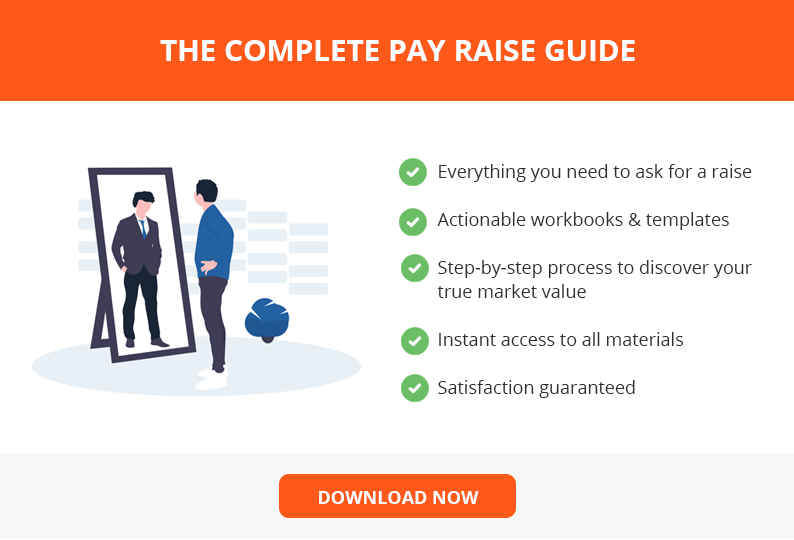Did you know: Only 19 percent of people are comfortable with their rate of pay. Wouldn’t you like to be one of them? So, stop being the 80 percent.
You know it’s raise season, and people are going to start getting their annual bumps in income. You wonder if you’ll make the company’s list year, but are you going to do something about it?
When to ask for a raise?
- Know your market rate by researching pay for your position in your area
- Understand how your education and qualifications may lead to higher pay for others in your position
- Understand how much you’re really allowed to ask for in your company
- Time your ask with the end of the fiscal year
When you want a raise, make it known to those who have the authority to give it to you. Sitting and waiting is not ideal. Be bold, and ask for a raise instead of waiting.
This is absolutely crucial, because nobody wants to just simply give out money. So show your company your value, and don’t wait until the last minute to put yourself out there.
You might be scared and that’s okay. Asking for a raise is worrisome, and can potentially damage your relationship with the company you work for. It is a delicate thing to ask for. Making sure it’s done right will save you and the company stress and time.
Nobody likes stress, right?
The time of sitting by watching those around you ask for a raise while you sit idly by is over. Today is a new day, and that day begins with you.
We’ll cover some common topics like:
- How to ask for a raise
- How to leverage your company’s budget cycle (when to ask for a raise)
- How to show the higher ups your value within the company
- How to do this all without coming across as pushy
So let’s dive right in, and take a look at everything you need to know about asking for a raise.
The art of asking for a raise
Regardless of when or why you’re asking for a raise, you’re going to need to know how to properly ask. This is crucial in succeeding. Believe it or not, a lot of it comes down to the language that you use and the trends in the market for your position.
Know your market rate
Understanding the value of your work in the market is crucial. So before you even set a meeting with your manager, make sure you know how much other with the same role as you get paid.
For example, if you’re in social media marketing department and the median salary is $50,000 for your area, that’s how much you should be getting paid.
This can definitely help you come raise time, because it show your employer that you’re worth more than you’re currently getting.
Understand your education and qualifications
This also ties into knowing your market, because you’ll want to make your employer aware of what other people who hold a similar educational degree are being paid. If the median wage for an MBA holder is $76,000, that is how much you should be looking for when you bring this to the attention of your employer.
Understand how much you’re really allowed to ask for
You need to be aware of how much you’re entitled to during raise season. If the average raise amount is 3% (which is the national average) you have no business asking for a 10-20% raise unless you’re really doing something extraordinary or move up in the company.
Set up a meeting with your manager
Once you have everything else prepared, and know a bit about your market, go ahead and set a meeting with your supervisor. This is important, because you don’t just want to stumble into their office asking for a raise out of left field. This could harm your chances, and reflect poorly on yourself. So try and get some time on the calendar, and if you have a performance review coming up, that’s even less stress for you.
What to say in a meeting with your supervisor or when you’re setting up a meeting
It's not just about what you say. It's how you say it. Language is key when asking for a raise. Share on XYou can know the facts, set the meeting, and be confident as ever, but if you don’t know what language to use, you might still fail. Language is key when asking for a raise, so here are some examples of language you might want to try out:
Examples of being direct
These examples are transparent but have low success rates.
“Would it be okay if went spent some of my performance review talking about my compensation package?”
“Would it be possible for us to get together and discuss my current compensation?”
Examples emphasizing tenure with organization
“I love the company I’m working for, and I think you do a great job, but I was wondering if we could talk about my compensation during this review”
Examples that lead with accomplishments
When you ask for a raise, focus on showing your value. This approach is the one that sees the best results.
“I think I did a really excellent job with that last project I was working on. Do you agree? [Let them talk before you do.] Okay great, so do you think it’s okay if we touch on my compensation during this meeting?”
“Thank you for meeting with me about my compensation today. I’d like to talk about my recent accomplishments, and discuss if you feel they’re worth a raise or not.”
These tips should definitely help you out with your language, and hopefully point you in the right direction to go in when asking for a raise. Also be sure to thank your supervisor, because they’ll likely be sticking their neck out for you.
Be ready for questions, and practice beforehand
If you’re in sales this should be nothing new for you, but believe it or not, you’ll need to pitch your supervisor if you want a raise. This technique requires practice, so make sure you practice what you’ll be saying prior to the meeting. This way, no matter what happens, at least you’re prepared. You should also be ready to handle any questions a supervisor may throw at you about your recent accomplishments.
Confidence and conviction are key here.
Knowing how to leverage your company’s budget cycle when asking for a raise
This next bit of information is also crucial when it comes to asking for a raise. This is due to the fact that most companies only have set times where they’re aloud to issue raises, or begin the process of growth. If you leverage this opportunity, and don’t wait until the last minute, you might finally get that raise you’re looking for.
Understand how your company assigns raises
You can be absolutely fantastic at asking for a raise, but if you fail to get your timing right you’ll run into quite a few problems. You need to know if your company assigns raises quarterly, annually, or semiannually. This will help you understand the appropriate timing to ask for a raise. This can also help you determine if it is a good or bad time to ask for one.
Know the budget
This is absolutely essential, because if your company is struggling, chances are they won’t be handing out any raises. Luckily, a quick Google search will net you some pretty good results that will indicate how your company is doing financially.
Try to ask for a raise when money is good versus when money is bad. Most companies have a budget that they allocate towards raises every year, so do your best to discover what that budget is and how much you could safely ask for.
Performance reviews
If your company is doing well, and you know they have money in their budget, asking for a raise during a review is your best bet. This will increase your chances, and can be a great way to show your supervisor the value you bring to the table. Not all reviews are quarterly, but the same rules apply regardless of if it is a semiannual review, annual review, or quarterly review.
Timing for the end of the fiscal year
Every company works differently, but most fiscal years end in January. During this time period, companies are usually starting to focus on their compensation packages for the upcoming year. This can be a great time to ask for a raise, because they’ll be focusing on their budget. Make sure you don’t wait until the last minute, and try to make a note of this in your calendar.
Is your manager prepared to make a case for you?
You might think that this is not important, but it is crucial. This is due to the fact that your supervisor is a gatekeeper when it comes time for your raise. Make sure you ask at a time where your supervisor is in a good mood. Or better yet, not under too much pressure from the company. If the company is having a bad quarter, it might not be a good idea to ask for a raise.
How to show the company you bring value to the table
At the end of the day, you won’t get a raise if you don’t deserve it. This means you need to work hard, and show your employer that you bring essential value to the table. Think about, without value why would they pay you more?
Have you completed any big projects?
If you’ve recently completed a big project, and it was very successful, this can help you when raise time comes around. It will give your employer evidence that you’re deserving of a raise, and not just asking for the sake of asking.
Show how you’ve increased profits
If you’ve completed a project that has netted the company an extra 10% in revenue, don’t you think you should be compensated for that? If this is the case, you should have a much easier time asking for a raise. Just make sure you ask, because they usually won’t come looking for you.
Show how your performance since your last review has increased
This is absolutely crucial, because if you’ve done a poor job, chances are you won’t be seeing a raise. So if you want to make sure your manager is going to give you a raise, make sure you show them how you’ve grown since your last meeting.
Have your accomplishments written out
This is important, because it will allow you to prove your talking points. Having your significant contributions written out is a great way for you to make sure your supervisor has no way to say no. If you’ve completed a big project, crushed a goal, or increased profits, make sure you write that down. You want to be able to show it to your supervisor.
The verdict
 Whether you’ve been at your company for 10 years or 10 months, getting a raise is an important part of working. Increased income can lead to a better quality of life, and can help you advance within the company. You need to know how much you’re worth, and prove that to your employer. That’s how you get a raise.
Whether you’ve been at your company for 10 years or 10 months, getting a raise is an important part of working. Increased income can lead to a better quality of life, and can help you advance within the company. You need to know how much you’re worth, and prove that to your employer. That’s how you get a raise.
While you might be a great employee who always meets deadlines and never misses a day, you’ll notice that there is a better way. A better way to get a raise that doesn’t require you to sit around on your hands.
So the next time raise season comes around, make sure you start planning ahead. Utilize some of these strategies. Make sure you’re leveraging your company’s budget cycle the next time you ask for a raise.
The secret about getting a raise is not how great of an employee you are. Instead, it’s how you ask and when you ask. So don’t walk in blind, and do some quick research before you ask for a raise.









